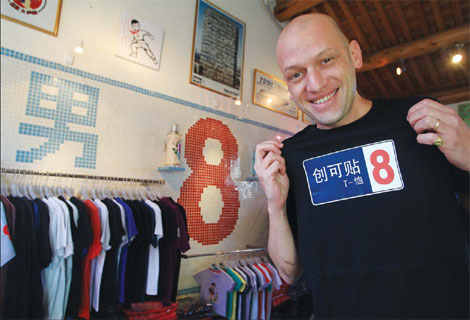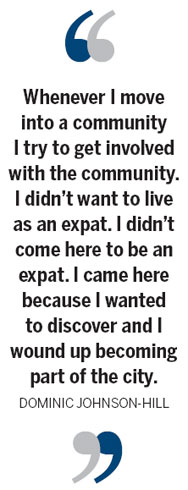Clothes maketh this man
Updated: 2010-12-24 11:13
By Todd Balazovic (China Daily European Weekly)
 |
|
The British Business Awards voted Beijing-based T-shirt king Dominic |
English entrepreneur pioneers hip streetwear culture and becomes one of the locals in old Beijing
When Dominic Johnson-Hill first stepped off the train and into the streets of Beijing he was carrying a backpack filled with all of his possessions - a few changes of clothes. He only had a fistful of dollars and no intention of sticking around.
In 1993, he didn't stay anywhere for too long.
Having just finished a three-year backpacking journey, which took him from his home in Guildford, England, to Africa, India and eventually to Beijing, the young world traveler planned on making a brief stop in the city to earn some funds, see the Great Wall and move onto his next adventure.
"When I arrived in Beijing I didn't have any money, so I had to start making money," the 37-year-old says. "I saw Western businesses edging into the Chinese market so I decided to do my part."
His part, it turns out, would do more than just earn him enough funds to travel, it would lead him to become a pillar of Beijing pop culture after founding one of China's first streetwear clothing brand, Plastered 8 T-Shirts.
The iconic fashion brand, which is known for visualizing creative twists on everyday elements of Beijing life, has since earned the easy going British businessmen celebrity status amongst local Beijingers.
But before he could claim ownership of an $800,000-a-year company, Johnson-Hill was just a wandering 20-year-old backpacker, running through the streets of the capital, which few would recognize today.
"During that time Beijing was a different world for foreigners. There were so few. The city has since changed quite a bit, but the charm has not," he says.
In 1995, Johnson-Hill recognized the increasing demand from Western businesses for information about the mysteries of the Chinese market and began his new career.
He started a grassroots market research business hiring Beijing taxi drivers to collect data on the perception of Western products that locals saw on market shelves. The taxi drivers were among the few people with vehicles at the time and had access to many thousands of people coming in and out of their vehicles.
Two years later, with more than 100 taxi drivers in six different provinces, Johnson-Hill had found success, and a permanent home.
"I do well in those situations where no one else is really willing to go," he says. "When most people see it as a challenge, I see it as an opportunity."
In 2005, Johnson-Hill took a bold leap from market research into retail after a neighboring hairdresser offered to rent him a small space where he could sell things.
 |
"At first I didn't have a single idea what to do with it. It was empty for almost a year. All my neighbors were swearing at me, day in day out, asking: 'Why are you paying money on this place and you're not selling anything?' but I wanted to do something interesting," he says.
His inspiration soon came after he spotted someone wearing an "I climbed the Great Wall" T-shirt.
"I thought: 'How can I better that T-shirt, make it more 2005?' so I redesigned it," he says. "And that's how the brand started, so I just started to design T-shirts."
Johnson-Hill admits his first design, a remake of the iconic "I climbed the Great Wall" T-shirt" with a woman in a bikini stamped over the Great Wall, didn't go over so well. "No one was buying the shirt," he says.
But he plough on, fired by his passion for Chinese culture and his enthusiasm for collecting old Chinese memorabilia. Johnson-Hill began eyeing everyday items that represented key aspects of daily life in the capital and gave them a twist.
"I thought to myself: 'I can't paint, I can't draw, and I can't use design software, but I can take icons from around Beijing and create a street brand that Chinese youth can call their own'," he says. "I took everything from subway tickets and thermoses to food tickets and illegal stickers on the streets and I created my first full range of T-shirts."
Other T-shirt images included Gold Fish dishwashing liquid, a religious-like stained glass image of Chairman Mao, and the image of military scientists as heroes.
By late 2005, Johnson-Hill had invested $6,000, his life savings, and was paying $200 a month for rent to sell his 'Plastered 8' T-shirts out of a 13 sq m shop in one of China's oldest residential areas, Nanluoguxiang hutong. Although he didn't know it at the time, his move into the area would later drastically change the face of the small residential street.
His success in creating a unique Beijing brand earned him the title of Entrepreneur of the Year Award in the 2008 British Business Awards and weekly slots on various Chinese television shows.
"I can't walk down the street without someone asking me if I'm the T-shirt guy," he says.
Johnson-Hill attributes his success to two things. First, he wasn't trying to be a Western company in a Chinese city, but instead was trying to be a Chinese company operated by a Westerner.
Second, it was because he became involved in the local community by serving on the local residency committee, a rare post for an expat, and his position allowed him to pull off stunts, such as staging China's first hutong fashion show in 2006.
"Whenever I move into a community I try to get involved with the community," he says.
"I didn't want to live as an expat. I didn't come here to be an expat. I came here because I wanted to discover and I wound up becoming part of the city."
Five years since opening his shop in Nanluoguxiang, the 800-year-old hutong has been transformed from a dated residential area into a thriving shopping street lined with cafes, restaurants, cool bars and boutiques shops boasting retro wear for Beijing's young hipsters. "My brand grew with Nanluoguxiang," he says.
The Plastered 8 brand is now earning more than $800,000 annually through three shops in Beijing and six nationwide, including his newest Shanghai outlet, which opened for the Shanghai Expo.
It has been more than 18 years since the young Johnson-Hill made a permanent pit stop, and he says he is still glad to call the city home.
"Beijing's one of those cities where the more it changes the more it stays the same," he says.
"Although physically it looks different, it still feels the same, it will never lose its charm."
E-paper

Ear We Go
China and the world set to embrace the merciful, peaceful year of rabbit
Preview of the coming issue
Carrefour finds the going tough in China
Maid to Order
Specials

Mysteries written in blood
Historical records and Caucasian features of locals suggest link with Roman Empire.

Winning Charm
Coastal Yantai banks on little things that matter to grow

New rules to hit property market
The State Council launched a new round of measures to rein in property prices.
